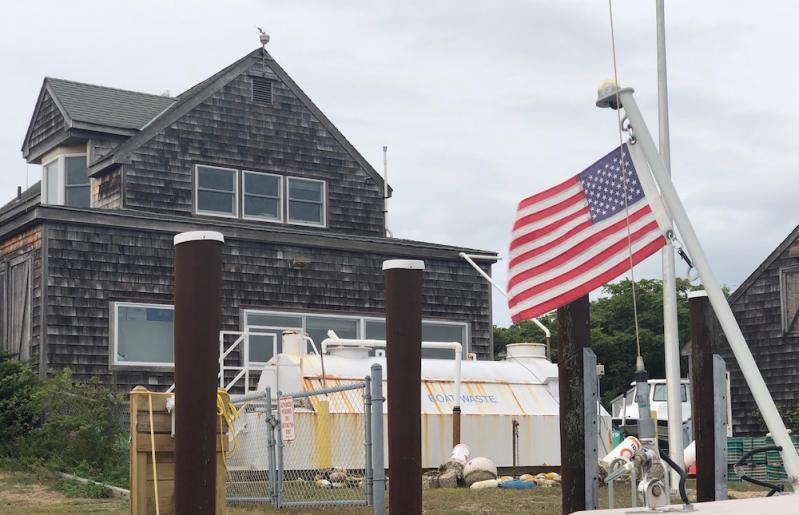“It’s bad out there!” one of the cartoonishly pretentious voiceovers on SiriusXM’s Yacht Rock Radio channel exclaims in horror. “Or at least that’s what we’ve heard from people who don’t live on a boat.”
As reported last month in The Star, the two pumpout boats owned and operated by the East Hampton Town Trustees were in particularly heavy use this summer, especially the one based at the Star Island municipal marina in Lake Montauk. The coronavirus pandemic, the trustees maintain, is behind the surge in boating activity, as well as boaters’ eschewing of showers and other public facilities at marinas in favor of those on board.
“This year, this Covid crisis caused a tripling in the amount of boating activities and people using their facilities,” Bill Taylor of the trustees said at their virtual meeting on Monday. “We really have to put a program together this off-season to be ready for next year, because it could very well be exactly the same.”
The discharge of sewage, treated or untreated, is prohibited in trustee waters. The entire Peconic Estuary is a designated no-discharge zone, and discharging of raw sewage directly into waters within three miles of land is illegal under federal law.
In somewhat abstract terms, Jim Grimes described to his colleagues a “crisis” in the days up to and including Labor Day weekend with the boat based in Lake Montauk and its associated land-based equipment, which includes a holding tank. (The other boat serves Three Mile Harbor.)
In Montauk, “we weren’t sucking as good as we could on a whole bunch of different levels,” he said, referring to the pumping of effluent from boats at Montauk’s marinas and its transfer to the tank on Star Island. “When we finally got to sucking pretty good, we had sucked too much, and the tank was filled at the Coast Guard Station, which created basically an effluent crisis” on Labor Day. “I kind of got stuck in this a little bit, and found myself basically up to my ass in it.”
A new boat, Mr. Grimes said, was urgent. “One thing that did come to light this summer is, it wasn’t as much a matter of having a backup boat as . . . we really had enough work out there. We could have had two boats running in Montauk.”
The trustees have considered just that -- a third pumpout boat -- for a few years, and have discussed obtaining a grant to acquire one. As it happened, the trustees were notified just hours before their meeting that the New York State Environmental Facilities Corporation had answered their application with a $60,000 grant toward that purchase through its Clean Vessel Assistance Program, Francis Bock, their presiding officer, said. The Environmental Facilities Corporation provides municipalities with financing for water quality infrastructure projects.
In addition to that grant, the trustees can apply for a separate grant of up to $35,000 for the rebuilding of an existing vessel, which they said is sorely needed. Mr. Taylor added that the community preservation fund can be another source of money.
Marine Boatbuilders Company of Warwick, R.I., a maker of custom pumpout boats, provided the trustees’ existing vessels. “They will take back a boat and refit it,” Mr. Grimes said. “In a perfect world, we would try and take delivery on a new vessel and then let them take our old vessel back and do the refitting, with the goal of having both boats ready and online for the 2021 boating season.”
The trustees have relied on its pumpout boat crew “to do a good job with equipment that’s falling apart,” Mr. Grimes said. “One thing that came to light this summer was that what we thought were backup materials that we had on hand that were usable, in reality were not. A lot of that stuff that we thought was backup material should have been thrown out.”
The existing pumpout boats are 23 feet long and can hold 400 gallons of effluent. A new one costs $105,000. A 26-foot model, featuring a 650-gallon tank, costs $182,750. “The 26-footers have more volume,” Mr. Taylor said, but maneuvering the larger boat could be difficult. “It might be a problem using them, getting them in and out of marinas.”
As if to illustrate that point, later in the meeting the trustees voted to spend $800 to repair a “ding to a yacht in Montauk,” a “fender-bender on the sea” involving the pumpout boat, one said.
Further, the boat operators are traveling such short distances between marinas and the holding tank on Star Island, Mr. Grimes said, that the greater capacity of the longer boat is unnecessary. The twin 200-horsepower engines on the larger vessel, said John Aldred, are “hardly necessary in Montauk.”
Regardless of its size, a new boat is a must, the trustees agreed. “This year was totally crazy,” Mr. Taylor said.




